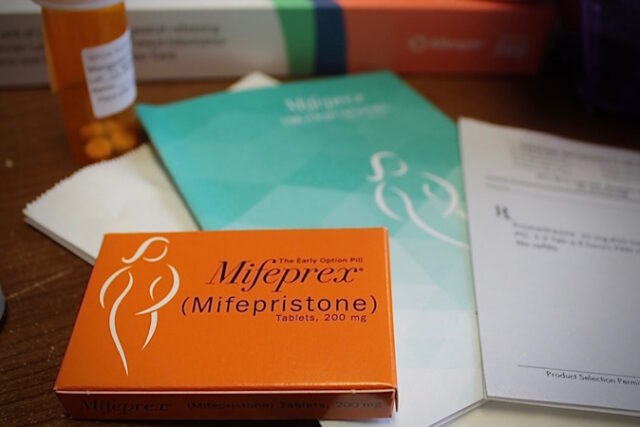
Florida’s six-week abortion ban, despite its medical exceptions, has led physicians and other healthcare providers to delay treatment for patients facing life-threatening complications, according to a report from the nonprofit Physicians for Human Rights.
For the report, published on Tuesday, 25 OB-GYNs, abortion providers, genetic counselors, and other health care professionals recounted specific instances when they had to navigate the legal minefields in the state’s abortion law.
The threat of being charged with a third-degree felony punishable with up to five years in prison, a $5,000 fine, and loss of their medical license looms over providers, who said they are afraid that performing an abortion could ruin their lives.
“There is no other field of medicine where people are like, ‘Oh, sorry, I cannot do your colonoscopy or whatever, because I just cannot,’” said an OB-GYN interviewed for the report.
“And that is tough on all [the doctors at her facility]. I think everyone has the skills. We cannot use them. We have the knowledge; we know it is safe. And so, you are turning people away for no real reason except to avoid going to jail, which is crazy.”
The report concludes: “Florida’s extreme abortion ban has created an unworkable legal landscape that endangers both patients and clinicians. The ban violates individual reproductive freedom, leads to preventable suffering, and compels clinicians to deviate from established standards of care and medical ethics.”
How do the exceptions work in real life?
The state law restricting abortion outlines exceptions, but the healthcare providers in the report said those exceptions create grey areas, forcing them into lengthy discussions with hospital lawyers and administrators while patients’ health worsens.
Two doctors have to certify that the termination of the pregnancy is necessary to “save the pregnant woman’s life or avert a serious risk of substantial and irreversible physical impairment of a major bodily function of the pregnant woman,” according to state law. A single physician can approve the procedure if no other doctor is available.
An OB-GYN interviewed for the report described a patient with stage four cancer who had to travel four hours by car to get an abortion because she was 21 weeks pregnant.
“In the middle of all that, you want to grab these Supreme Court judges and bring them in the room and say, ‘Look what you are doing to people. Let this woman be able to receive palliative chemotherapy, which is the least we can do for her, for Christ’s sake.’ What we put
her through was so cruel and unnecessary,” the OB-GYN told the researchers. “It took over a week for her to be able to get the procedure.”
Another exception allows abortions to the third trimester if the fetus has a fatal abnormality, which medical professionals also have struggled to define.
A maternal-fetal medicine specialist told Physicians for Human Rights that she had a patient who was 18 weeks pregnant but the fetus had Edwards Syndrome, a genetic condition causing multiple malformations which 20% to 40% of newborns survive for a month and no more than 10% survive longer than a year.
The patient couldn’t secure an abortion in Florida because a pediatric cardiologist couldn’t conclude that Edwards Syndrome constituted a lethal heart defect, and she couldn’t travel out of state because she was the sole caretaker for her mother with severe Alzheimer’s, according to the report.
“Two months later, the baby died in utero. And you can think of all the hurt there was for her in carrying a pregnancy for eight weeks for no reason other than state laws intimidating and altering patient care,” the specialist said.
Debate over abortion-rights amendment
The Florida Agency for Health Care Administration often highlights the legal exceptions, including in a webpage that has spurred multiple legal challenges and criminal complaints because it claims the abortion-rights Amendment 4 “threatens women’s safety.”
Politifact, a fact-checking website, also deemed an ad from amendment sponsor Floridians Protecting Freedom to be “mostly false” for claiming that the six-week ban has “no real exceptions.” However, that report included evidence that attempts to apply abortion exceptions around the country can be ineffective.
State agency changes what procedures count as abortions
A day after the six-week ban went into effect, AHCA released a rule stating that circumstances such as ectopic pregnancies and the premature rupture of the amniotic sac (PPROM) don’t count as abortions.
As the agency published the rule, it complained that disinformation about the six-week ban posed a danger to pregnant women.
“The Agency finds there is an immediate danger to the health, safety, and welfare of pregnant women and babies due to a deeply dishonest scare campaign and disinformation being perpetuated by the media, the Biden Administration, and advocacy groups to misrepresent the Heartbeat Protection Act and the State’s efforts to protect life, moms, and families,” the rule states.
However, the exception for patients experiencing PPROM does not guarantee that care won’t be delayed. An OB-GYN told the researchers that she had a patient with an 18-week pregnancy who needed an abortion because of the rupture of her amniotic sac. The patient had to go to another hospital for the procedure.
“In that process, [the patient] got infected, got chorioamnionitis and became septic, and ended up needing admission and IV antibiotics at the academic hospital. So, yeah, just not being able to just admit that patient that day and proceed with an induction was unfortunate for her,” the OB-GYN said.
AHCA did not immediately provide a comment.
Disclaimer
The information contained in South Florida Reporter is for general information purposes only.
The South Florida Reporter assumes no responsibility for errors or omissions in the contents of the Service.
In no event shall the South Florida Reporter be liable for any special, direct, indirect, consequential, or incidental damages or any damages whatsoever, whether in an action of contract, negligence or other tort, arising out of or in connection with the use of the Service or the contents of the Service.
The Company reserves the right to make additions, deletions, or modifications to the contents of the Service at any time without prior notice.
The Company does not warrant that the Service is free of viruses or other harmful components












